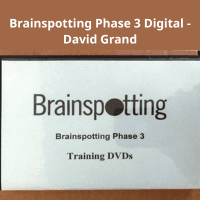Course Summary:
“Brainspotting Phase 3 Digital” by Dr. David Grand is an advanced, in-depth training designed for practitioners who have completed Brainspotting Phases 1 and 2 and are ready to explore the deeper intricacies of this powerful neuro-processing modality. This course moves beyond the foundational concepts, delving into more complex applications and theoretical underpinnings. Participants will learn advanced techniques for identifying and processing core neurophysiological sources of emotional and physical pain, trauma, and dissociation. The training emphasizes the nuanced art of working with the “felt sense” and the “brainspot” to facilitate profound healing and integration. It aims to equip therapists with sophisticated tools to address challenging client presentations and enhance therapeutic outcomes.
Target Audience:
This program is specifically designed for:
- Licensed mental health professionals (e.g., psychologists, social workers, therapists, counselors) who have already completed Brainspotting Phase 1 and Phase 2 training.
- Practitioners seeking to deepen their expertise in trauma-informed therapy and advanced neuro-processing techniques.
- Therapists working with complex trauma, dissociation, chronic pain, or performance enhancement.
- Clinicians committed to continuous professional development in cutting-edge therapeutic modalities.
Main Content (Likely Topics):
Based on typical Brainspotting Phase 3 curriculum, the course likely covers key areas such as:
- Advanced Resource Spotting: Deepening the use of resources for stabilization and titration of activation.
- Expansion Brainspotting: Techniques for processing expansion and integration, beyond just activation.
- Advanced Gazes and Eye Positions: Exploring more subtle and specific eye positions and their impact on the brainspot.
- The Power of Neuro-Processing: Deeper understanding of how Brainspotting facilitates brain-body processing and integration.
- Working with Dissociation: Specific strategies and considerations for using Brainspotting with dissociative clients.
- Complex Trauma Applications: Applying Brainspotting to highly complex trauma cases, including developmental and relational trauma.
- Somatic and Physiological Orienting: Enhanced focus on the body’s responses and somatic integration during processing.
- The Brainspotting Frame: Further refining the therapeutic frame and relationship within a Brainspotting context.
- Integration with Other Modalities: Discussing how Brainspotting can be effectively integrated with other therapeutic approaches.
- Supervision and Consultation Principles: Guidance on navigating challenging cases and seeking professional support.
Please remember that this is a general outline, and the exact content may vary slightly based on the specific course iteration.
Master advanced Brainspotting methods for deeper therapeutic transformation!
SIGN UP NOW







